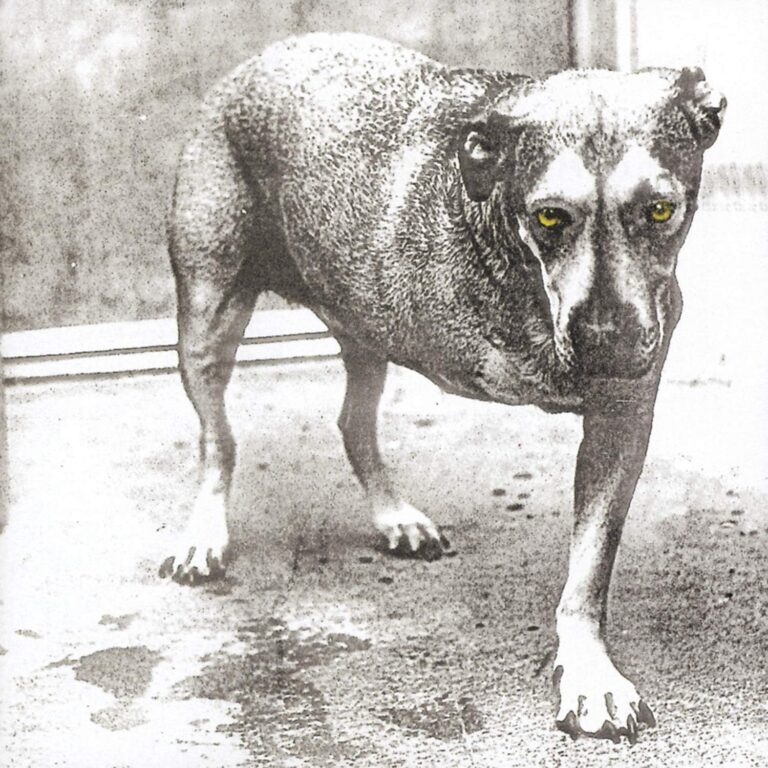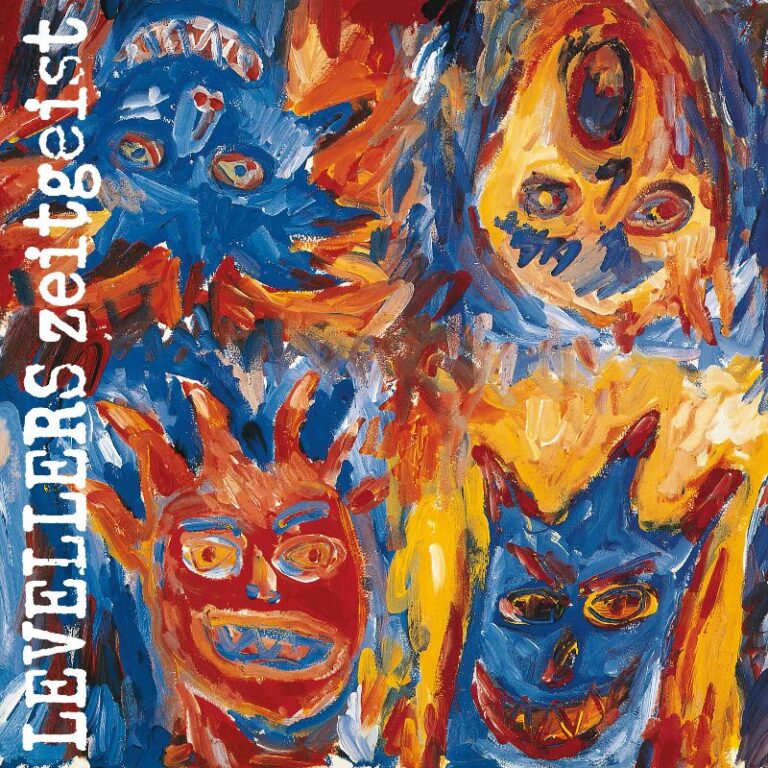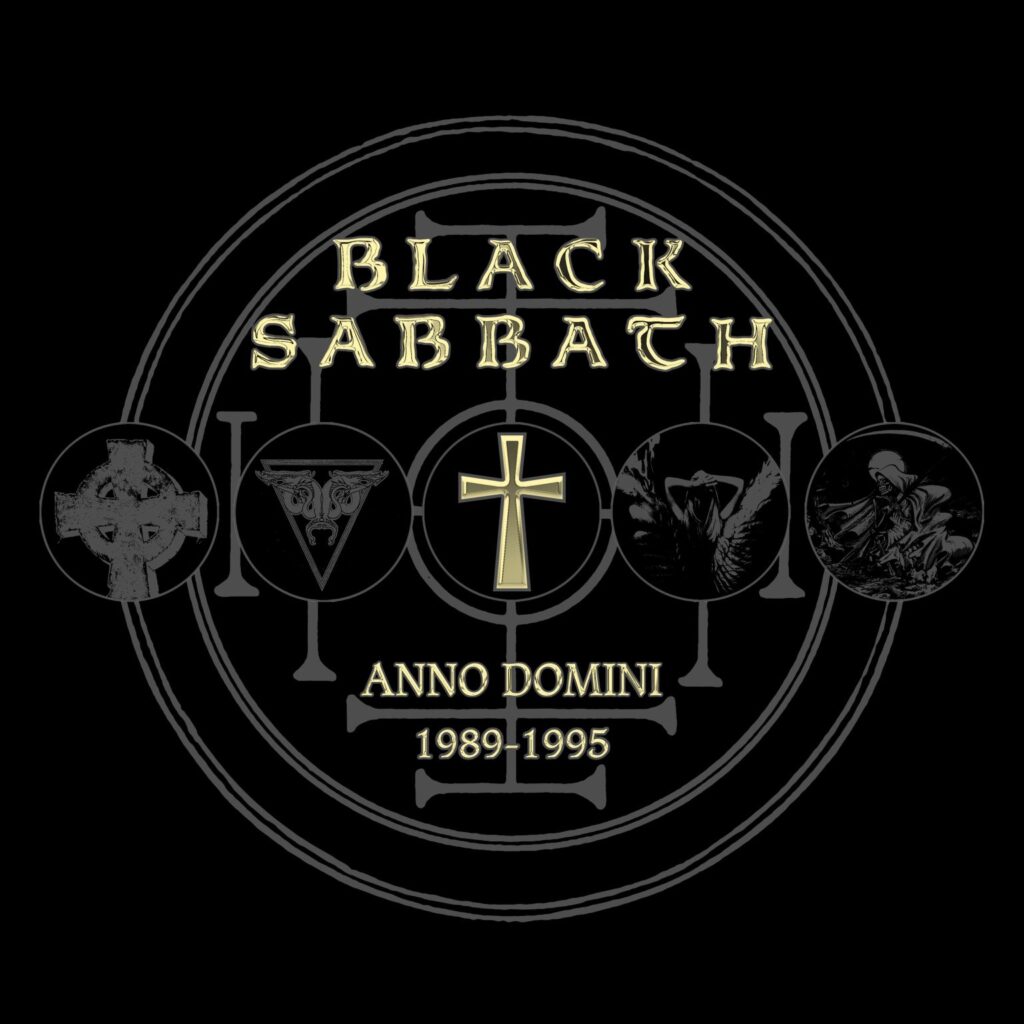
Introduction
In a sense, Anno Domini 1989 – 1995 has the potential to be the most highly anticipated of all the Black Sabbath Super Deluxe boxsets so far, partly because it’s so unexpected and partly because, the albums that represent the band’s classic canon having been reissued and repackaged so many times, this offers something genuinely new.
Bringing together four of the five Tony Martin-era albums in remastered (and, in the case of Forbidden, remixed) form, it is almost the ultimate celebration of a most underrated period in the band’s history. “Almost” because the set is absent both the excellent Eternal Idol (1987), which is understandably missing due to rights issues, and Cross Purposes Live, which is less forgivable in its omission. Nonetheless, it is an enticing offering that seeks to overcome years of unjust prejudice, restoring a run of albums that, while not as groundbreaking as their antecedents, nevertheless kept the Black Sabbath flame alight at a time when a good number of bands were simply hanging up their irons and heading out to pasture.
Most importantly, it is an opportunity for Tony Martin to finally be recognised for the significant talent that he is. While any singer having to step into a spot previously occupied by Ozzy Osbourne and Ronnie James Dio could have due cause for nerves, Tony delivers remarkable performances across all five of the albums on which he featured, at times sounding uncannily like Dio, at other points recalling Chris Cornell, but always pitching his vocals with precision and power. As such, while it is to some extent understandable that he was overshadowed by the legendary status of his predecessors, he deserves far better than to be treated as an afterthought, and Anno Domini 1989 – 1995 is as much the story of his tenacity and skill as it is of Sabbath’s survival.
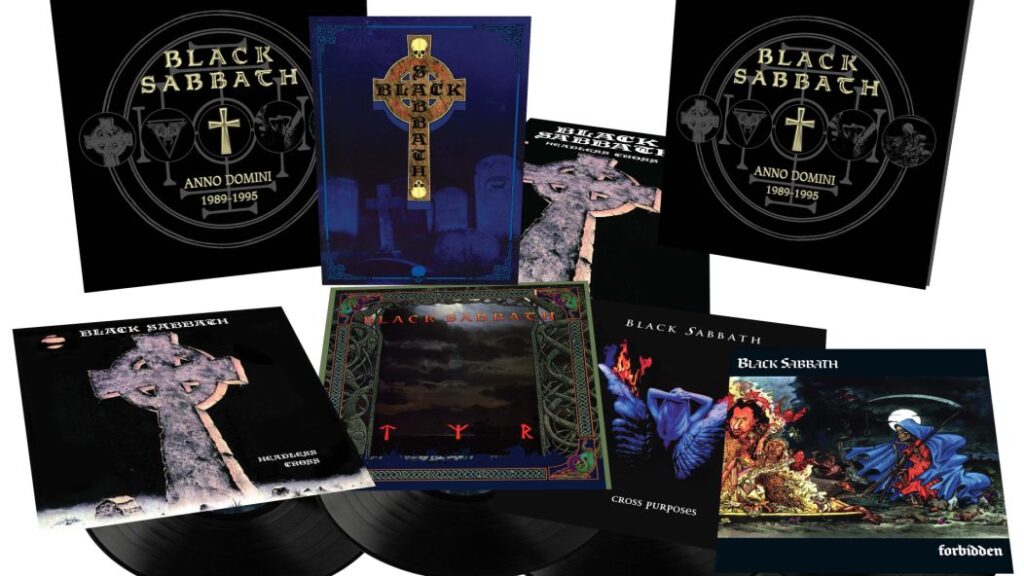
The Package
As with previous Sabbath Super Deluxe editions, Anno Domini 1989 – 1995 is neatly packaged in a rigid case with a lift-off lid. With this being a multi-album box set, it has unique art on the cover, featuring the iconic Sabbath Cross, with logos related to each album subtly placed around it. There’s also a splash sticker detailing the contents.
Inside, whether you opt for CD or vinyl, you’ll find each album in its own sleeve, an accompanying book (with notes from the redoubtable Hugh Gilmour), the 1989 Headless Cross tour programme, and a poster from the same tour. For the vinyl set, all four albums are housed in single sleeves, with plain black (poly lined) liners. There are no inserts, although lyrics and credits are reprinted in the book. The book itself is a soft cover effort, which is a shame when you compare it to the previous hardback outings, but this is presumably to help keep the cost low, and Hugh’s notes are as detailed and informative as ever.
As for audio, the only real difference between the two sets is that the CD version includes an additional three tracks (spread across three of the four discs) – Cloak And Dagger on Headless Cross, What’s The Use on Cross Purposes, and Loser Gets It All on Forbidden. Given the brevity of the tracks, it’s hard to see why these couldn’t have been included in the LP edition as a 7” but, this aside, the versions are identical in terms of track listing.
Minor gripes around the book’s format and bonus tracks notwithstanding, this is another quality outing for Sabbath, and full marks to the team who put it together with such obvious love and care.
Audio Content
For this set, each of the albums has been remastered, with the exception of Forbidden which has been fully remixed by Tony Iommi. Perhaps because of this remix treatment, the cover of Forbidden has changed from its original release, whilst the other LPs retain their original art.
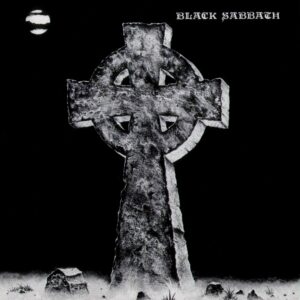
Headless Cross (1989)
In 1988, after eighteen years with Warner Bros. Records, the label unceremoniously dropped Black Sabbath, with I.R.S. helping Iommi pick up the pieces. With singer Tony Martin and keyboardist Geoff Nicholls remaining from the Eternal Idolline up, Tony recruited session bassist Laurence Cottle (Alan Parsons Project) on bass, and Cozy Powell (Jeff Beck, Rainbow, Whitesnake) on drums. This was to prove a powerful line up, and Headless Cross emerges as one of the strongest albums outside of the Ozzy / Dio years.
Side 1 sees Sabbath deliver a taut set that wastes little time in getting to the point. Following the brief noise collage of The Gates Of Hell, the band plunge into the Dio-esque Headless Cross. With only the stadium rock drums more-or-less carbon dating the track, it’s an explosive opener that does a good job of introducing the audience to the streamlined hard rock of Sabbath circa 1989. It’s followed by the equally impressive Devil & Daughter, which boasts a blistering solo and a powerful chorus. Not a million miles from the sound of Queensryche, it shows that Sabbath were far from a spent force during this period, the band more than capable of keeping up with the upstarts when it came to dishing out the riffs. The first side concludes with the slow burning When Death Calls. A showcase for Tony’s powerful vocals, it is a dynamic track that neatly bridges the high energy opening numbers and the doom-laden world of vintage Sabbath.
Kicking off side 2, Kill In The Spirit World sees Sabbath further exploring the keyboard-washed heavy metal sound that dominated the late eighties, and the result is a compelling hybrid of Europe, Sabbath, and Dio’s solo work. With the band briskly moving from an absurdly catchy verse to a crushingly heavy chorus, it sees Iommi fearlessly exploring Sabbath’s past and heavy metal’s present, all in five short minutes. It’s followed by Call Of The Wild, a more typically hard rock number that is the weakest moment here, largely because it appears to be following trends rather than leading them. That said, it boasts one hell of a chorus, not least thanks to Geoff’s airy keyboards and Tony’s impassioned vocal. Things take a more positive turn with Black Moon, which boasts a hulking great riff, and a restrained, yet powerful performance from Powell. The album concludes with Nightwing, which digs into the band’s doom roots to deliver an immensely satisfying conclusion. With elements highlighting where the band would go years later with their Heaven and Hell project, Nightwing offers some of the album’s heaviest riffs and most devastating solos.
A deeply impressive follow up to the strong Eternal Idol album, Headless Cross ups the ante in almost every regard. Sensibly nodding to the metal of the day, without being led by it, the band turn in a credit worthy performance and the resultant album is a well-paced and dynamic body of work that passes in the blink of an eye. 8.5/10
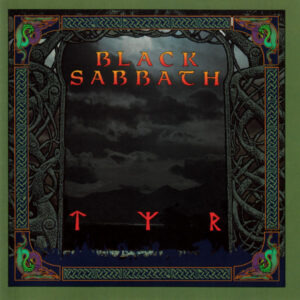
Tyr (1990)
A bit of an oddity in the Sabbath canon, Tyr is not only one of the heaviest Sabbath albums, but it also sees a very different lyrical approach, singer Tony Martin having been told to back off from Satanic themes. With much the same line up as Headless Cross – only Laurence Cottle left between albums, to be replaced by Neil Murray (Whitesnake, Gary Moore) – Tyr proved divisive on release, although it has a number of cracking tracks to offer to those adventurous enough to explore.
Opening side 1 on a very different note to that which had gone before, Anno Mundi sounds like early Queen crossed with Led Zeppelin, although the chugging riff that kicks in after the lengthy intro is pure Sabbath. Nevertheless, with a greater emphasis on multitracked vocals, it showcases Tony Martin’s increasing confidence in driving the band’s sound. Next up, The Law Maker does much to predict power metal, with its soaring leads, fast-paced riffs and hard-edged vocals.
The first track to really hark back to the streamlined hard rock of Headless Cross, Jerusalem is a cracking anthem, with a great riff and a chorus custom built for the live environment. The side concludes with the none-more-heavy The Sabbath Stones, a brilliantly dynamic slab of heavy metal that incorporates elements of doom, acoustic guitars, and a bravura vocal performance into 7 perfect minutes.
Side 2 sees Sabbath engage in some of their most evocatively cinematic work. It opens with Geoff’s keyboards very much to the fore as he paints a sonic picture on The Battle Of Tyr. A short introduction, it gives way to the gorgeous, picked acoustic guitar of Odin’s Court, an equally brief piece that sets the scene for the monstrous Valhalla. A perfect example of Sabbath being ahead of the curve, this blazing triptych feels like a road map for the battle metal that emerged in the early 00s, while Tony Martin delivers another peerless performance on a track that sits among the best pieces the band ever recorded. Unfortunately, with Valhalla having faded out, the band change pace completely with Feels Good To Me, a ballad added purely to give the album a single. It’s by no means a bad song, but it doesn’t fit with the preceding three tracks, and it really breaks up the flow. Similarly, while a strong hard rock track, Heaven In Black, lacks the innovation of the opening trio, and you can’t help but wonder how much better the album might have been had it been sequenced differently.
Overall, Tyr is a very different outing for Sabbath. While a couple of the tracks nod to the band’s traditional sound, there’s a sense of them really trying something new and, for the most part, succeeding. The biggest loss is that, having started side two so impressively, the band lose focus, dropping in a ballad that, frankly, feels out of place. Nevertheless, there’s plenty to enjoy on Tyr, and it’s a worthy inclusion in the set. 7.5/10
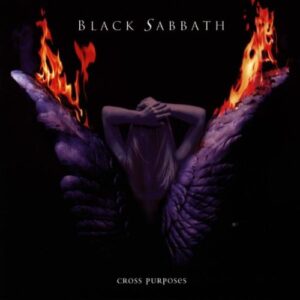
Cross Purposes (1994)
Following a brief digression, which saw Tony Iommi working once more with Ronnie James Dio, Geezer Butler, and Vinny Appice for the excellent Dehumanizer album, the line up had shifted again by the time Cross Purposes came around in 1994. While Geezer remained on board, yet another new drummer was drafted in – Bobby Rondinelli (Rainbow, Doro) – while Tony Martin returned to the fold.
Side 1 opens with the driving hard rock of I Witness, which has a hard-edged bluesy undercurrent to it. With scorching solos and plenty of energy in the performance, it kicks the album neatly into gear. The band follow up on this promise with the equally potent Cross Of Thorns, which emerges from its eerie, keyboard-soaked intro to offer up some suitably skull crushing riffs. A powerful track in its own right, it also provides a showcase for Tony, who delivers an epic vocal performance that soars over Iommi’s guitars. Things take a darker turn with Psychophobia, which explodes in a flurry of dizzying riffage, the stabbing verse set against a satisfyingly melodic chorus. Even better is Virtual Death which, with its sinister bass and carefully layered vocals, slips into Alice in Chains territory via Sabbath’s first two albums. The first side closes with Immaculate Deception, which pitches an awkward beat and keyboards into the mix, all leading to an epic chorus that ends things on a high.
The bluesy edge returns as the band open side 2 with the surprisingly understated Dying For Love, which has a strong Whitesnake vibe to it. While in 1994, this type of blues-infused rock was somewhat on the backfoot, it’s interesting to note that the song has a timeless power to it, not least thanks to Tony’s peerless performance behind the mic, and it’s easy to imagine this being a huge hit were it to be released today, with only the fade out proving a disappointing end to the track. The band snap back hard with the tungsten groove of Back To Eden, which sees Tony employing a gritty, Chris Cornell style on the verse.
The band convincingly wrongfoot the listener with the gossamer-fine introduction to The Hand That Rocks The Cradlegiving little warning of the crunchy rocker that is wating in the wings. The band have more surprises in store, as they offer up Cardinal Sin, a densely packed monster of a track that sounds like Alice in Chains and Queen covering Kashmir, and it sounds immense. The album concludes with crunchy rocker Evil Eye, which has a more traditional Sabbath feel to it, not least thanks to the heavy bottom end Geezer brings to the piece, and it brings the album to a satisfyingly heavy close.
The strongest set here, Cross Purposes manages the difficult feat of bridging the classic Sabbath sound with some rather more adventurous pieces that see the band reclaiming their heritage from the likes of Alice in Chains and Soundgarden without sounding derivative. With another stunning performance from Tony, and the band sounding fired up, Cross Purposes may just be the strongest of the four albums on offer, although it’s a tough call. 9/10
Forbidden (1995)
For 1995’s Forbidden, the Tyr line up returned for a deeply polarising album that ended Sabbath’s run of original albums until 2013, when they returned with 13. Deeply unpopular upon release, it found the band struggling to find their place – an identity crisis not helped by the presence of Body count’s Ernie C. behind the mixing desk.
Yet, for all the opprobrium the album has received, there are some strong songs on the set (especially on the excellent second side), making this remix an opportunity to revisit it, shorn of all preconceptions, and hear it as a new outing once again. The results are frequently surprising and, while it’s easily the weakest album here, there are plenty of worthwhile moments, although it’s a scattershot collection overall.
Side 1 kicks off with the rather odd The Illusion Of Power (feat. Ice-T), which opens with an almighty riff, suddenly changes direction, and ends up sounding like a cross between Body Count and the histrionic delivery of Phil Lynott circa Jeff Wayne’s War Of The Worlds. Even with Iommi’s chunky remix, it’s a bizarre choice for an opening number, and it’s easy to see why those hearing the album for the first time in 1995 would be nonplussed. Yet, for those who stay the course, the slinky Get A Grip is a decent track, that cleaves closer to the Sabbath sound of old (especially with this remix), albeit with a punky outro that echoes what Henry Rollins was doing around the same time. In contrast, the keening Can’t Get Close Enough is a slow-paced ballad with a vocal delivery that feels like Tony was trying to cram too many syllables into the available space. That sense carries over into Shaking Off The Chains, although it works better, aided no end by the stabbing riffs the band deploy. However, rather than consolidate things with another hard hitter, the first side concludes with another ballad – I Won’t Cry For You. While not a terrible song, it suffers from its placement, and it brings the side to an underwhelming close.
Side 2 sees things pick up as the band deliver the tighter, harder Guilty As Hell. With a solid riff and sneering vocal, it merely underscores the already forming notion that the record works best when the band put the pedal to the metal. While Sick And Tired doesn’t quite pack the same punch, it has some cool, bluesy licks, and it paves the way for the excellent Rusty Angels, which boasts a memorable chorus and emotionally charged solo. Keeping things heavy, the toughened stomp of Forbidden is another great song, and one that would easily stand shoulder-to-shoulder with anything on the preceding albums. The album spins to a halt with dynamic masterpiece Kiss Of Death which, with its eerie opening and monstrous riff, is easily the best thing on the album, bringing Forbidden to a thunderous close.
A frustrating album, you can almost feel the various factions fighting over the direction the album should take, with Ernie C., label, and Sabbath all vying for dominance. The result is an uneasy compromise, where tracks like Illusion Of Power uneasily rub shoulders with power ballads. However, by the time you get to side 2, Sabbath seem to have won the fight, with Guilty As Hell, Rusty Angels, and Kiss Of Death all belonging to a better overall album. Ultimately, while this is unlikely to be the Sabbath album that anyone would reach for first, the remix at least highlights the stronger tracks in the set, and side 2 in particular is well worth a spin. 6/10
Final Thoughts
This is one hell of a box set. While not perfect – largely because it misses both the first Tony Martin era album and the Cross Purposes Live offering – the typically informative liner notes, interesting ephemera, and excellent quality of the mastering makes this essential for Sabbath fans. More to the point, it is such a pleasure to see the Tony Martin era of the band receive such lavish treatment. It’s a period of Sabbath’s history that has been unfairly overlooked for far too long, and this four-disc box of treasures does much to redress the issue. 9/10
